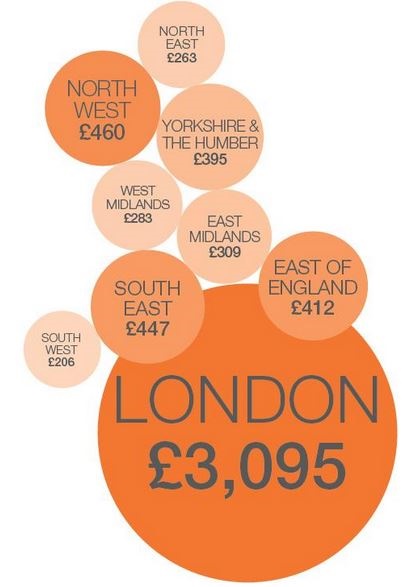05.03.15
Transport for the North should get £15bn devolved funding – IPPR North
The government should commit to devolving a £15bn transport funding package over 10 years to local authorities ‘to make the Northern Powerhouse a reality’, according to IPPR North.
The think-tank has produced its ‘Transport for the North’ report, the launch of which PSE attended in Manchester today.
The report is a blueprint for the north to take greater control over its own transport decision-making via the Transport for the North (TfN) body, emulating Transport for London in the capital.
Formed in order to bring forward a more detailed One North investment proposals by March 2015, and to work with the Department for Transport on a northern transport strategy, the TfN partnership is constituted of the five northern city regions together with Hull and the Humber. It is a separate body to Rail North, which is made up of many more local authorities and focuses on rail franchising issues as well as long-term investment.
IPPR North has claimed that TfN would help redress these disproportionately low levels of investment, after revealing that planned spend per resident on transport infrastructure from 2014-15 onwards was £3,095 for London, but much lower for the northern regions: £460 in the north west and £263 in the north east, for example.

As part of a three phase approach for developing TfN, the think tank has recommended that a transport commissioner for the north should be appointed as well as move towards a contactless ticketing system and managing its own rail franchise.
Within the latest report, IPPR North said that TfN should “maximise the economic, social and environmental performance of the north of England by ensuring that it has the most effective forms of connectivity within and between its constituent parts, and extending out into national and international networks and markets”.
Ed Cox, director at IPPR North, highlighted that this vision will be achieved through a clear focus on three overlapping outcomes: a more productive and competitive northern economy; a more accessible and accountable transport network in the north; and a more environmentally sustainable northern transport network.
Cox, an author of the report, told an audience at PwC’s Manchester office: “The north of England has experienced disproportionately low levels of government investment in its transport infrastructure. I want to set out a plan for devolving and integrating transport systems in the north.
“Transport is absolutely key if we’re going to drive growth in the north of England. But we have seen huge disparities both historically and in what we plan to spend in the future. This must be addressed.”
The think-tank is calling on chancellor George Osborne to use his last Budget of the Parliament to give a £15bn devolved funding package to local authorities. A move Cox believes is “entirely possible”.
In the latest study it highlighted Sir David Higgins’ 2014 report which said in order for the north to fully benefit from the High Speed Two (HS2) rail link, internal connectivity must be substantially improved and an integrated national transport system put in place.
Simon Kirby, chief executive at HS2 Ltd, told the audience that phase 2 will significantly reduce travel times to the north west, with faster and easier connections between northern cities creating increased opportunities to strengthen and to grow.
“In terms of east-west connectivity, Sir David Higgins flagged the issue in 2014 of poor connectivity between Liverpool and Manchester, Manchester and Leeds, Leeds and Hull,” he said. “Sir David recommended to the government that they invest in improving rail in between east and west – this would significantly reduce journey times between Liverpool, Manchester, Leeds, Sheffield and Hull.”
Kirby added that this would stimulate local economies and more work is being done on this matter, especially by TfN. “We are working closely with them to integrate our plans for transport in the north.”
Jon Lamonte, CEO of Transport for Greater Manchester, added that TfN is far more than speaking with one voice on what government should do for the north.
“It is about re-assigning power between Whitehall and the north to be able to shape and prioritise on the pan-northern networks in the interest of growth,” he said.
“Through TfN we intend to establish the right arrangements to ensure that all transport decisions are taken with a wider knowledge of the local growth potential.”
Lamonte welcomed the latest IPPR report, adding: “When TfN’s report comes forward in the next few weeks it is, and always has been, an interim report. We are on a journey. We won’t achieve everything in one step. But we are getting on the right track, with the help of people like IPPR North, for delivering a stronger plan the north.”
Vernon Everitt, TfL’s managing director of Customer Experience, Marketing and Communications, also discussed how the north can learn lessons from the transport system operated in the capital.
“There has been success of the framework we have in London,” he said. “The main ingredients to delivering this include having a solid institutional framework to start with; secondly having an integrated transport authority that genuinely blends roads, rail, buses and everything together; and the third is steady and sustained investment.”
Everitt also backed plans for ‘open-loop’ ticketing systems being used across the north, which allow payment by contactless bank card or mobile phone. He stated that providing customers with good information and hassle-free ticketing can deliver very fast benefits.
However, he added that while the report should be welcomed there is perhaps an opportunity to up the pace in terms of how things are developed in terms of technology and improving customer experience.
Tell us what you think – have your say below, or email us directly at [email protected]